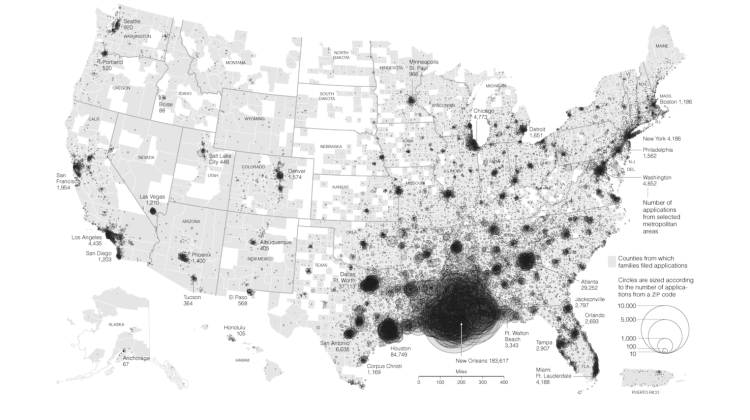Studying the Impacts of Race on Neighborhood Housing Prices

Map showing the distribution and number of the 1.36 million individual post Katrina FEMA assistance applications as of Sept. 23, 2005. Via the New York Times
How does the displacement of survivors of acute disaster events - such as hurricanes - impact receiving neighborhoods? What can these impacts tell us about housing markets preferences for segregation along racial and ethnic groupings? And with the intensifying number of climate crisis events, what might these findings suggest about the future for survivors and housing markets across the United States?
These questions are explored in a new paper for the Journal of Urban Economics, that leverages data from migration induced by Hurricane Katrina from New Orleans to neighborhoods in Texas. The displacement effects caused by Hurricane Katrina represent a large number of individuals, a population composed disproportionately of marginalized individuals, and a novel exchange between the studied cities. The authors of the paper include DUSP’s devin michelle bunten, DUSP alumna Madeleine Daepp (PhD ‘20), and University of Michigan’s Joanne Hsu.
“While I was a student at DUSP, Hurricane Maria displaced over 130,000 people. I thought the case of Katrina could tell us something important about the responses we could expect in Florida cities–and from climate displacement more generally,” said Daepp. “Albert Saiz’s research on the impacts of immigration on the housing market, which tells us that even small flows of movers can have big effects, particularly when movers are marginalized – but I couldn’t find any research on housing market impacts. That’s in part because there were no good records of where most people had moved to after the storm – but thanks to a fellowship at the Federal Reserve Bank of Boston, I had access to a consumer credit database that offered a new way to identify where Katrina survivors had been displaced to.
bunten is the Assistant Professor of Urban Economics and Housing. At DUSP, their research uses economic theory and empirical tools to study a range of urban topics, including gentrification and neighborhood change, restrictive zoning, and the white supremacy at the root of American housing. Daepp is a senior researcher in the Urban Innovation Initiative at Microsoft Research, her research seeks to leverage a multidisciplinary approach to promote health equity and climate adaptation in cities. Hsu is an Associate Professor at the Institute for Social Research at the University of Michigan where she focuses her research on household finance, labor economics, and survey methods.
“Our research found that housing prices fell in Texas neighborhoods after receiving an influx of Hurricane Katrina survivors—exactly the opposite of what a simple supply and demand framework would suggest. By ruling out plausible alternatives, we show that this is likely driven by the responses of non-Black Texans to the arrival of Black New Orleanians. Those responses reveal a preference for segregation,” said bunten.
“As climate disasters displace more people every year, planners should expect that a preference for segregation will shape the impacts of those disasters,” added Daepp.


